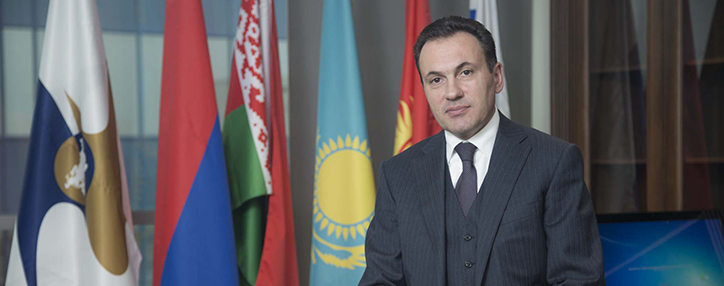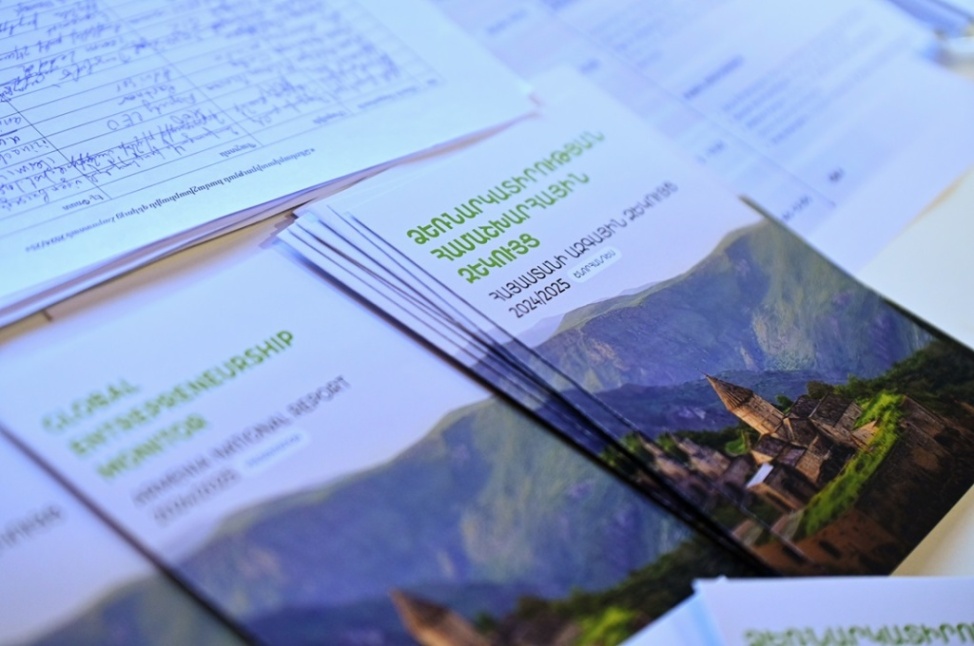Tigran Davtyan: common financial market of EEU will give Armenia serious competitive advantage
11.10.2017,
13:44
The Eurasian Economic Commission (EEC) is a permanent supranational regulatory body of the Eurasian Economic Union.

YEREVAN, October 11. /ARKA/. The Eurasian Economic Commission (EEC) is a permanent supranational regulatory body of the Eurasian Economic Union. It has been operating since November 2011 and has the status of a supranational governing body subordinate to the Higher Eurasian Economic Council (HEEC). The main task of the EEC is to secure conditions for the functioning and development of the EEU, the Customs Union, the Common Economic Area, and development of proposals for integration within these associations. In October 2016 Tigran Davtyan was appointed as Director of the Financial Policy Department of the Eurasian Economic Commission. Upon taking up the job, he said that the main priority of his work was the promotion of formation of the common financial market for EEU. A year later, in an interview with the ARKA news agency, he speaks about the results achieved in the first year of his tenure.
ARKA - Mr. Davtyan, how would evaluate the results of your work over the past year, and what kind of difficulties did you have to face?
T. Davtyan - Integration processes as a whole are very long and complicated, for the simple reason that each of the five member countries of the Union has its own priorities, and it is sometimes very difficult to direct them into one channel. The problem is that none of them wants to sacrifice their sovereignty. The financial sector is still more complicated. You know that under the EEU agreement the common financial market should be created by 2025. It seems that there is enough time, but it flies very quickly.
ARKA - What steps are being taken today, and what goals have been achieved over this year?
T. Davtyan - At present we are working on one of the successful examples of an interstate agreement allowing brokers and dealers to work in another country without licensing and any other agreements. We call it provision of a national regime, and this is one of the positive aspects. The second thing that we did was to start developing a concept for a common financial market, which is in full swing now. The beginning was made in December on behalf of the presidents of our countries, and now the countries are discussing this concept. The question is often asked: what is this all about? First, it is done for consumers and financial service providers, so that they can work as comfortably as possible, i.e. the issuer of securities or the investor should feel in another country as comfortably as in their own. Now an agreement is being prepared for the mutual recognition of securities. We are working to liberalize measures in monetary policy. We will try to build a single exchange space in the near future. This does not mean that there should be one exchange; simply there should be uniform requirements for the participants. As for the tax sphere, we should act very delicately here, since this sphere is very sensitive, since it affects the sovereignty of our countries. The agreement states that we should not touch tax sovereignty, but there are areas where we need uniform standards, for example, in terms of excise taxes.
ARKA – You have pointed out the advantages of the common financial market. Are there any negative aspects that our investors and businessmen will face when creating it?
T. Davtyan - I can not name the negative moments now. For example, Armenia is a small country, and if we have a common financial market, it will mean for us an exit from the small local market to the big market of the EEU. And this means raising funds, and the possibility of placing securities in the EEU markets. Regarding the financial sphere, there are only advantages.
ARKA Can you say today that investors from the EEU show interest in the Armenian market?
T. Davtyan – Until all these agreements work, I can not say that they will result in increased in interest. Armenia is becoming a more attractive country for investors in recent years, and I think that we will see a concrete result when our agreements enter into force and start working. -0-
ARKA - Mr. Davtyan, how would evaluate the results of your work over the past year, and what kind of difficulties did you have to face?
T. Davtyan - Integration processes as a whole are very long and complicated, for the simple reason that each of the five member countries of the Union has its own priorities, and it is sometimes very difficult to direct them into one channel. The problem is that none of them wants to sacrifice their sovereignty. The financial sector is still more complicated. You know that under the EEU agreement the common financial market should be created by 2025. It seems that there is enough time, but it flies very quickly.
ARKA - What steps are being taken today, and what goals have been achieved over this year?
T. Davtyan - At present we are working on one of the successful examples of an interstate agreement allowing brokers and dealers to work in another country without licensing and any other agreements. We call it provision of a national regime, and this is one of the positive aspects. The second thing that we did was to start developing a concept for a common financial market, which is in full swing now. The beginning was made in December on behalf of the presidents of our countries, and now the countries are discussing this concept. The question is often asked: what is this all about? First, it is done for consumers and financial service providers, so that they can work as comfortably as possible, i.e. the issuer of securities or the investor should feel in another country as comfortably as in their own. Now an agreement is being prepared for the mutual recognition of securities. We are working to liberalize measures in monetary policy. We will try to build a single exchange space in the near future. This does not mean that there should be one exchange; simply there should be uniform requirements for the participants. As for the tax sphere, we should act very delicately here, since this sphere is very sensitive, since it affects the sovereignty of our countries. The agreement states that we should not touch tax sovereignty, but there are areas where we need uniform standards, for example, in terms of excise taxes.
ARKA – You have pointed out the advantages of the common financial market. Are there any negative aspects that our investors and businessmen will face when creating it?
T. Davtyan - I can not name the negative moments now. For example, Armenia is a small country, and if we have a common financial market, it will mean for us an exit from the small local market to the big market of the EEU. And this means raising funds, and the possibility of placing securities in the EEU markets. Regarding the financial sphere, there are only advantages.
ARKA Can you say today that investors from the EEU show interest in the Armenian market?
T. Davtyan – Until all these agreements work, I can not say that they will result in increased in interest. Armenia is becoming a more attractive country for investors in recent years, and I think that we will see a concrete result when our agreements enter into force and start working. -0-



